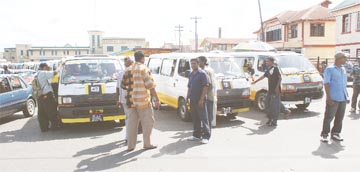Some East Coast mini-bus operators are less than pleased over the recent fare reduction order by the Ministry of Commerce arising out of the recent reduction in fuel prices and in accordance with the agreement reached between their Association and the ministry. And some operators plying routes along the East Coast have dropped a broad hint that they may be prepared to assume a confrontational posture, making clear to Stabroek Business that the agreement notwithstanding, among the operators, the jury is still out on whether or not they will accede to the fare reduction order.
Mini-bus operators and the government have locked horns on previous occasions over fares and among drivers and conductors with whom this newspaper spoke there is only partial endorsement of the discourses that have been taking place between the Operators Association and the Ministry of Commerce. Subject Minister Manniram Prashad has been insistent that government will seek to ensure realistic fare levels in order to ensure that passengers are not exploited. Among mini-bus drivers plying routes between Mahaica and Georgetown there is open resentment over what they say is a formula that appears to take account mostly of fuel prices while overlooking other costs associated with operating minibuses.
The Owner/Driver of a bus plying the Georgetown/Mon Repos route told Stabroek Business that operating costs for mini-buses “are connected to other things apart from gas. There is wear and tear and the prices of parts don’t remain stable,” he said. Another East Coast driver bluntly told this newspaper that “what goes up should never come down” since once fares are increased other expenses “kick in” and those do not go away if and when the fares are reduced. He said that a good example of this was the fact that drivers who are not owners find themselves having to work harder in order to meet owners’ demands for more money when there is a fare increase. “Not all owners do it but some do,” the driver said, adding that “when the fares go down again” there would be no question of paying the owner less.
Another East Coast driver who operates between Georgetown and Plaisance told Stabroek Business that he had formed the distinct impression that government was setting out “to make mini-bus operators look bad.” He said that while the Minister of Commerce never seems to tire about mini-bus fare levels and the need for government to protect commuters from exploitation, there were other areas of high consumer costs which do not appear to bother the authorities. “There is VAT for a start. The government has refused to drop the VAT levels; and then there is the price of food. Is the government checking to make sure that the people who run shops and stores are not overcharging?”
Among the mini-bus drivers with whom Stabroek Business spoke many expressed the view that the private transportation sector was an easy target since, according to one driver, “it is easy to make it look as though by charging higher fares they are exploiting passengers. “The easiest thing in the world for the Ministry (of Commerce) to make it look as though the minibus operators and the commuters are enemies.” One driver said. Another driver told Stabroek Business that he believed that the image which the mini-bus operators had created had a lot to do with the feeling on the part of government that it could force fares down.
Among commuters at the East Coast bus park with whom Stabroek Business spoke last Wednesday there was guarded optimism that fares may be reduced over the weekend. One Beterverwagting resident said that a likely scenario might be that while fares for some routes may be reduced, operators for other routes may “hold one head” and refuse to bring fares down. She said that in the circumstances and given what she believed was government’s inability to enforce fare increases there could well be confrontations between passengers and operators.

